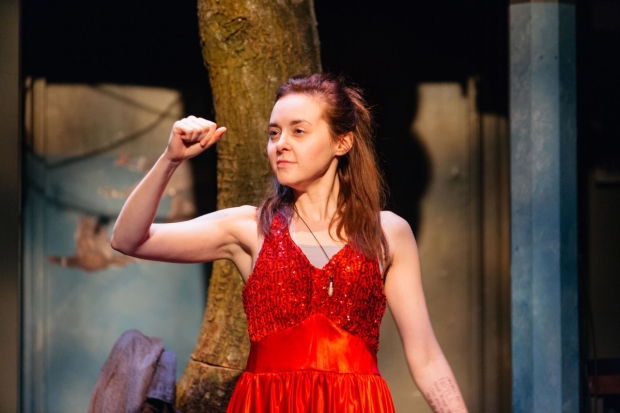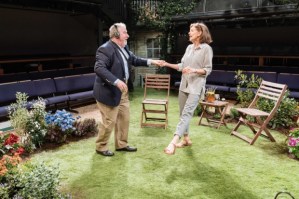Review: Mayfly (Orange Tree Theatre)
Joe White’s new play deals with grief in a rural village in Shropshire

© Helen Murray
What a difference a day makes. The titular insect of Joe White's new play is hatched, lives, gives birth and dies all in the space of just 24 hours. In White's piece, that potential for change over the course of one day is translated to one rural Shropshire family. They are at a turning point, one year on from an event that has twisted them and their lives out of shape forever.
It all starts with a stranger. When Harry rescues Ben from the river one morning on the way to work, both men think that their odd, fraught encounter will end there. Ben is struggling, a year after a death, with his daughter Loops and his wife Cat, to make sense of things. Cat wants to reconnect with Ben after a year of their marriage slowly eroding, Ben wants to garden and not talk about what he's feeling. Meanwhile the army-loving Loops has woken up and decided that this day is the day that she will get a boyfriend. So when Harry meets Ben on that riverbank, it's just the beginning. As the family flail around helplessly in their loneliness and grief, they knock into someone who might just be able to help them turn a corner.
It's testament to White's writing that though this is a play about how we deal with the death of a loved one – and also in some ways the death of a rural community – it's brilliantly funny. Even in the play's darkest moments, there are laugh-out-loud lines. The humour is there in the awkwardness of the situations and the way the innocent, good-willing Harry, who just wants to help everybody out, gets inadvertently drawn in to some very unexpected places. It's there in the throwaway, deadpan lines about how crap Aston Villa are, delivered just after Ben is pulled from the river.
White has a way with the countryside lilt too, and the patter and intonation of the exchanges are beautifully rhythmical and real despite the fact that the accents feel a little more Devon and Cornwall than Shropshire. In the first few moments he lays the foundations too for recurring imagery; after Ben swallows river water, Harry warns him about ‘drowning on dry land' later in the day. It's a pertinent metaphor for someone whose grief seems to be suffocating him.
The final scene edges on the formulaic, as revelations are spoken out around a dinner table, and the plot gets a little muddled occasionally. But you can forgive that when you also get Harry's beautiful final monologue, delivered by Irfan Shamji. It illuminates the darkness and longing of the loss of a loved one and it is spoken with depth and lightweight poignancy by Shamji – a star of the night and surely of the future. It is the play's climax and galvanises the family to see beyond their own misery.
The rest of the cast are excellent, with Evelyn Hoskins' Loops a taut, violently rigid squirm of unhappiness. She is very funny and her exchanges with Shamji are wonderfully pitched. Simon Scardifield does what he can with a slightly underwritten Ben and Niky Wardley's messed up Cat is painful to watch. But it is Shamji who is the quiet, unassuming centre of this play, and he shines throughout it.
A day may not seem a long time, goes the message of White's play, but it's time enough to heal and grow. As a family begins to look up and out from the pit of their despair they find other people, and that, says White, is all you need.



















